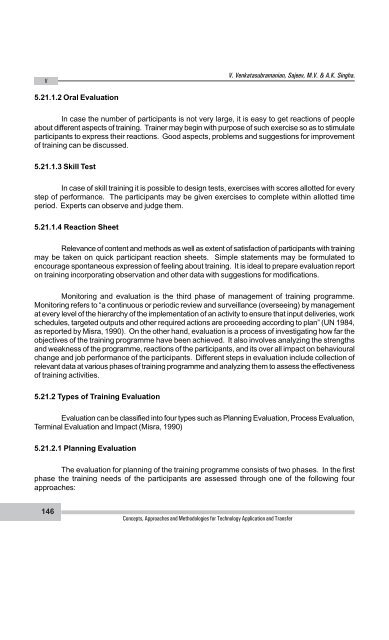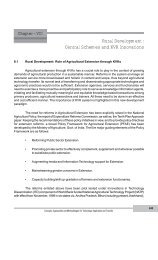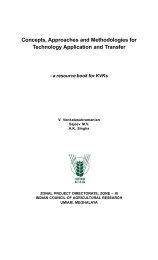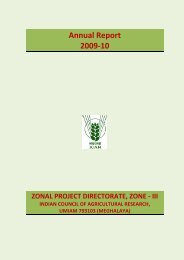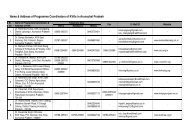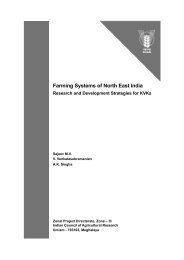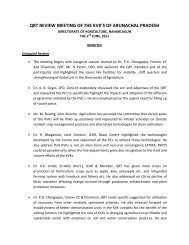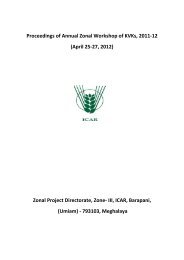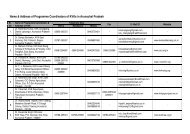Training Methodology for KVK Scientists - ICAR, Zonal Project ...
Training Methodology for KVK Scientists - ICAR, Zonal Project ...
Training Methodology for KVK Scientists - ICAR, Zonal Project ...
You also want an ePaper? Increase the reach of your titles
YUMPU automatically turns print PDFs into web optimized ePapers that Google loves.
V<br />
V. Venkatasubramanian, Sajeev, M.V. & A.K. Singha.<br />
5.21.1.2 Oral Evaluation<br />
In case the number of participants is not very large, it is easy to get reactions of people<br />
about different aspects of training. Trainer may begin with purpose of such exercise so as to stimulate<br />
participants to express their reactions. Good aspects, problems and suggestions <strong>for</strong> improvement<br />
of training can be discussed.<br />
5.21.1.3 Skill Test<br />
In case of skill training it is possible to design tests, exercises with scores allotted <strong>for</strong> every<br />
step of per<strong>for</strong>mance. The participants may be given exercises to complete within allotted time<br />
period. Experts can observe and judge them.<br />
5.21.1.4 Reaction Sheet<br />
Relevance of content and methods as well as extent of satisfaction of participants with training<br />
may be taken on quick participant reaction sheets. Simple statements may be <strong>for</strong>mulated to<br />
encourage spontaneous expression of feeling about training. It is ideal to prepare evaluation report<br />
on training incorporating observation and other data with suggestions <strong>for</strong> modifications.<br />
Monitoring and evaluation is the third phase of management of training programme.<br />
Monitoring refers to “a continuous or periodic review and surveillance (overseeing) by management<br />
at every level of the hierarchy of the implementation of an activity to ensure that input deliveries, work<br />
schedules, targeted outputs and other required actions are proceeding according to plan” (UN 1984,<br />
as reported by Misra, 1990). On the other hand, evaluation is a process of investigating how far the<br />
objectives of the training programme have been achieved. It also involves analyzing the strengths<br />
and weakness of the programme, reactions of the participants, and its over all impact on behavioural<br />
change and job per<strong>for</strong>mance of the participants. Different steps in evaluation include collection of<br />
relevant data at various phases of training programme and analyzing them to assess the effectiveness<br />
of training activities.<br />
5.21.2 Types of <strong>Training</strong> Evaluation<br />
Evaluation can be classified into four types such as Planning Evaluation, Process Evaluation,<br />
Terminal Evaluation and Impact (Misra, 1990)<br />
5.21.2.1 Planning Evaluation<br />
The evaluation <strong>for</strong> planning of the training programme consists of two phases. In the first<br />
phase the training needs of the participants are assessed through one of the following four<br />
approaches:<br />
146<br />
Concepts, Approaches and Methodologies <strong>for</strong> Technology Application and Transfer


